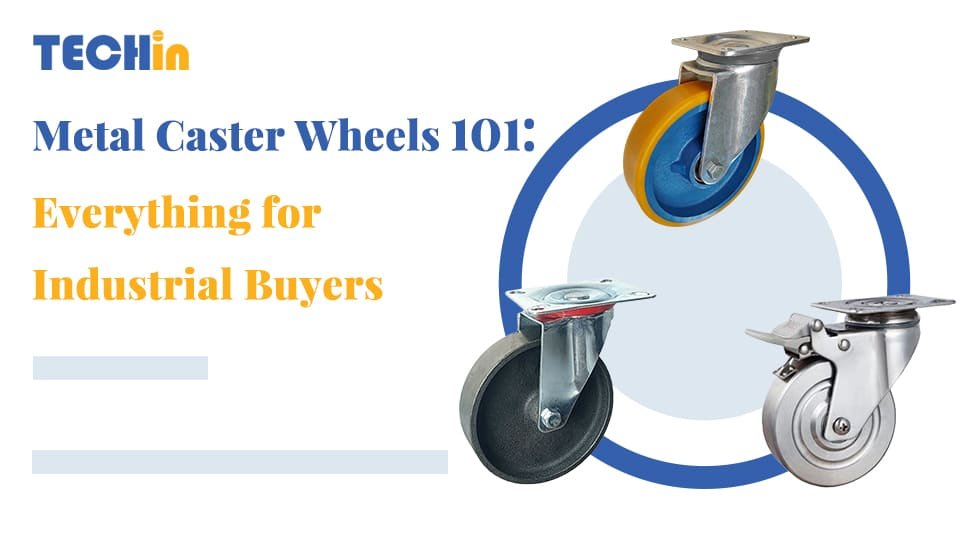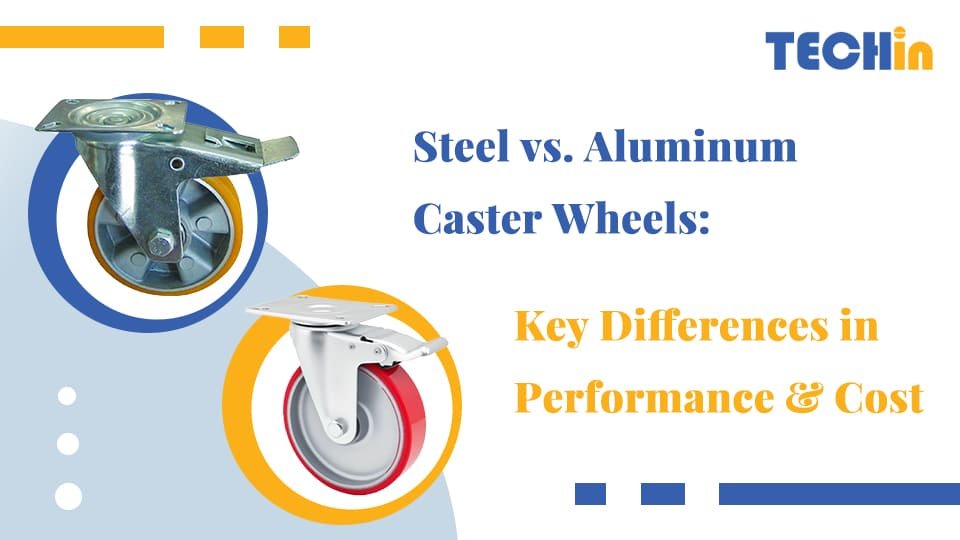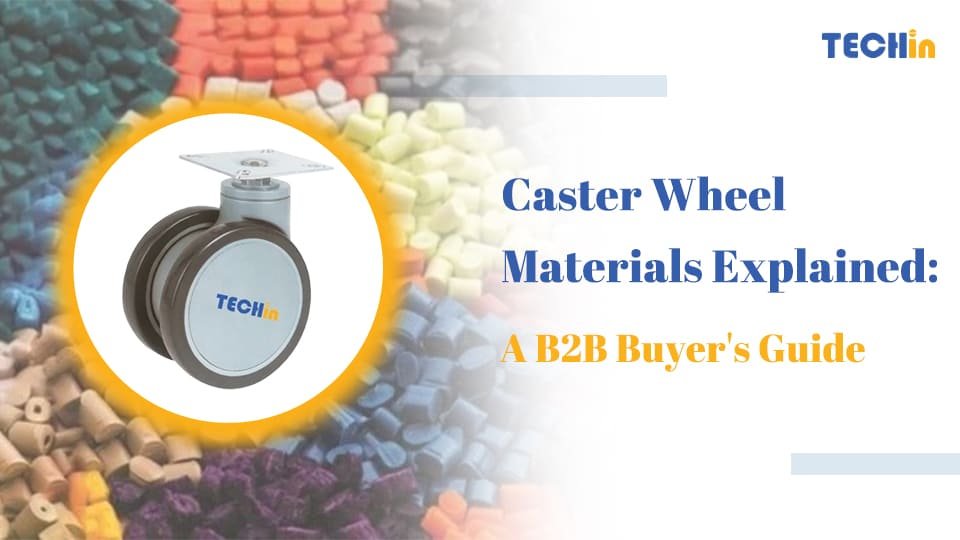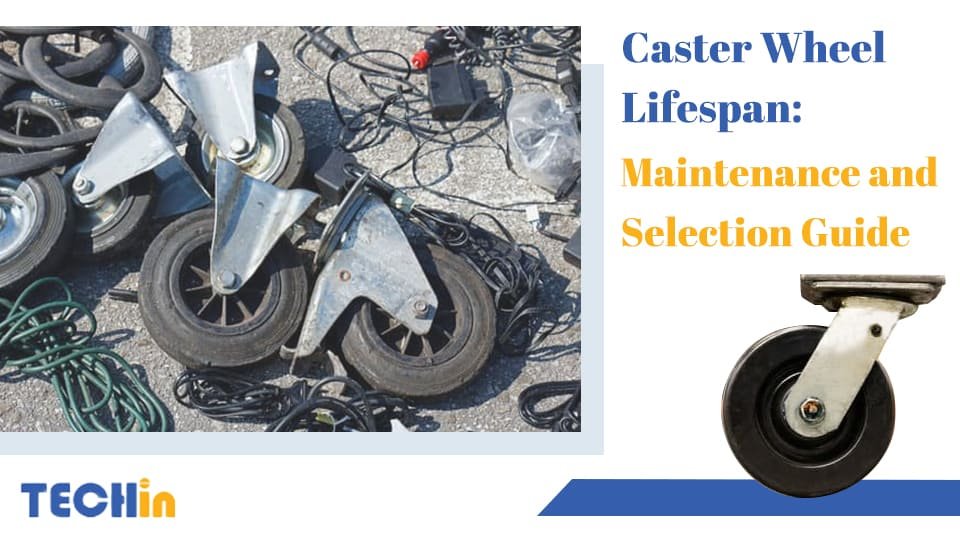A common concern for buyers is that the wrong castor wheels could damage expensive hardwood floors—or simply fail under load. With so many options available, making the right choice can be challenging. TPE and rubber are two leading materials, but each serves a different purpose. This guide provides a clear comparison to help procurement professionals and discerning buyers make an informed decision.
To summarize, think of it this way: TPE castors are engineered for performance. They offer superior durability, chemical resistance, and load capacity, making them ideal for commercial and industrial applications on hardwood floors. Rubber castors, on the other hand, are the floor protection specialists. Their softer, quieter roll is perfect for preserving delicate wood surfaces in offices, homes, and other noise-sensitive environments. For demanding, high-use scenarios, TPE is the logical choice. For maximum floor care and quiet operation, rubber is unmatched.
Before we get into a direct comparison, let’s establish a clear understanding of what TPE and rubber castors are and their primary benefits for hardwood flooring.
What Are TPE Castors?
TPE (thermoplastic elastomer) is a hybrid material that merges the elasticity of rubber with the durability and processing benefits of plastic. TPE castors are constructed by molding a soft TPE tread onto a rigid polypropylene or steel core. This creates a wheel that is both structurally sound and gentle on surfaces.
Advantages of TPE Castors:
- Excellent durability on hard surfaces, including hardwood and tile.
- Outstanding resistance to chemicals, oils, and cleaning agents.
- Good shock absorption for safely moving heavy equipment.
- Low rolling resistance for smoother, more efficient movement.
- Long service life, especially under continuous or heavy loads.
- Widely used in healthcare, manufacturing, and food processing.
You will often find high-performance polyurethane casters for hardwood floors are made from TPE or similar advanced compounds.
What Are Rubber Castors?
Rubber castors are typically made from natural or synthetic rubber. These materials are sometimes blended with additives like neoprene to enhance specific properties. The soft rubber tread is bonded to a steel or plastic hub, resulting in a wheel designed for quiet and protective movement.
Advantages of Rubber Castors:
- Superior floor protection, particularly on sensitive hardwood and laminate.
- Ultra-quiet operation, making them ideal for noise-sensitive environments.
- Gentle rolling action that minimizes the risk of scuffs or marks.
- Natural absorption of shock and vibrations.
- The standard for light-duty furniture, office chairs, and trolleys.
These are the go-to choice for applications requiring soft rubber casters for hardwood floors, including dining chair casters and office chair casters for hardwood floors.
Which Castor Is More Durable: TPE or Rubber?
When it comes to long-term durability under demanding conditions, TPE is the clear winner.
TPE is specifically engineered to resist abrasion, cracking, and tearing, making it perfectly suited for industrial environments with frequent use. While soft and floor-friendly, rubber tends to degrade more quickly, especially when exposed to heat, UV light, or sustained heavy loads.
For equipment and transport carts that require long-lasting performance, TPE is the more reliable choice.
Which One Is Quieter: Rubber or TPE Castors?
For quiet operation, rubber castors have a distinct advantage.
The material’s soft tread naturally absorbs vibrations and dampens sound, resulting in minimal noise when rolling across hardwood. This makes rubber the preferred option for quiet spaces like offices, libraries, and medical facilities. Neoprene rubber, in particular, excels in these settings.
If noise reduction is a primary requirement, rubber castors deliver superior acoustic performance.
Which Castor Protects Hardwood Floors Better?
For protecting delicate flooring, rubber castors are the gentler option.
Soft gray rubber castors significantly reduce the likelihood of scratching, scuffing, or denting hardwood floors. While TPE is non-marking and smooth, its relative firmness means it can potentially leave impressions over time, especially with high point loads on small-diameter wheels.
To ensure maximum protection for premium flooring, soft rubber or neoprene rubber casters are the recommended choice.
TPE vs. Rubber Castor, Which Offers Better Shock Absorption?
Both materials provide effective shock absorption, but they function differently.
- TPE offers a structured and predictable shock absorption, balancing flexibility with firmness. This is ideal for protecting sensitive equipment during transit.
- Rubber provides a more cushioned response, especially with lighter loads, but it can compress significantly under repeated heavy impacts.
For precision control and industrial use, TPE’s performance is more consistent. For general furniture and lightweight applications, rubber provides excellent cushioning.
Are TPE Castors More Chemical Resistant Than Rubber?
Yes. TPE offers significantly better resistance to chemicals, oils, and common cleaning solutions.
This makes it the standard in environments where sanitation and exposure are factors, such as:
- Hospitals and on medical equipment
- Food processing facilities
- Laboratories and cleanrooms
Standard rubber can degrade, swell, or soften when exposed to harsh chemicals or oils.
If your application involves regular cleaning or potential contact with chemical agents, TPE is the safer, more durable option.
Which Castor Supports More Load on Hardwood Floors?
In general, TPE castors support higher loads without deformation.
Their robust, high-density structure allows them to be used in heavy-duty applications, including:
- Industrial carts and trolleys
- Machinery bases
- Heavy equipment racks
Softer rubber castors can flatten or “bulge” under high weight, which increases rolling resistance and reduces efficiency. TPE maintains its shape and ensures smooth operation, even under loads of several hundred kilos.
If load-bearing capability is a key factor, TPE consistently outperforms rubber.
How to Choose Between TPE and Rubber Castors?
Here is a summary to guide your selection process:
| Feature | TPE Castors | Rubber Castors |
|---|---|---|
| Durability | High – Designed for long-term, heavy use. | Moderate – Best for light to medium-duty use. |
| Noise Reduction | Good – Low noise. | Excellent – Very quiet operation. |
| Floor Protection | Good – Non-marking, but firmness can be a factor. | Excellent – The softest and most protective option. |
| Shock Absorption | Moderate to Strong – Structured and controlled. | Strong – Cushioned, but can compress. |
| Chemical Resistance | Excellent – Resists oils, cleaners, and chemicals. | Poor to Moderate – Varies by rubber type. |
| Load Capacity | High – Ideal for heavy equipment and machinery. | Low to Moderate – Suited for lighter loads. |
Pro Tip: For procurement managers and hardware distributors, offering both TPE and rubber castors is a strategic advantage. It allows you to meet diverse customer needs, from industrial performance to delicate floor care. A supplier like Techin provides high-quality options in both materials, ensuring your customers have access to the right solution for any application.
Summary
Choosing the right castor wheel requires balancing floor protection, durability, and the specific demands of the application. Both TPE and rubber are excellent materials, but they are engineered for different tasks. By carefully considering your environment, load requirements, and flooring type, you can make a confident and effective purchasing decision.
Do you have questions or experiences with these castors? Feel free to contact us!










